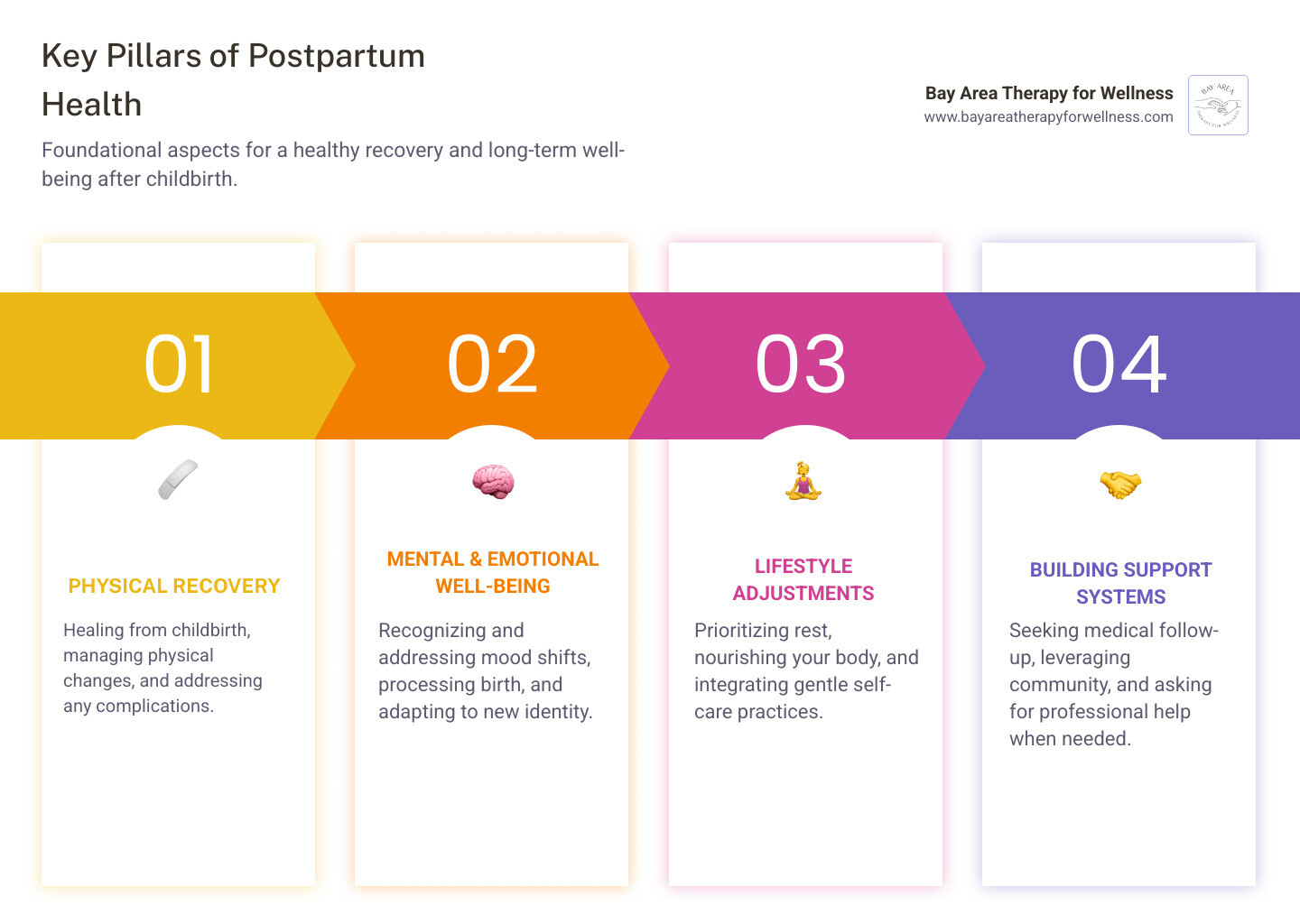Why Postpartum Health Matters More Than You Think: A Bay Area Mother's Guide to Thriving After Birth
You planned everything perfectly. The nursery is Pinterest-worthy, you've researched the best organic everything, and your Lovevery subscription arrived right on time. You thought you'd have this motherhood thing figured out by now. Instead, you're exhausted but can't sleep, obsessing over every detail while feeling completely disconnected from the joy you expected. If you're silently wondering where the maternal bliss went and feeling like you're failing at the one thing you prepared so meticulously for, you're not alone, Bay Area Therapy for Wellness is here for you.
As a solo therapist specializing in maternal mental health in the Bay Area, I see this story every day. High-achieving women who conquered graduate school, built successful careers, and approach everything with research and determination suddenly find themselves in uncharted territory. Your postpartum health encompasses so much more than physical recovery—it's about your mental health, emotional well-being, and finding your way back to yourself while growing into your new identity as a mother.
The Truth About the "Fourth Trimester" No One Talks About
The moment your new baby arrives, the world shifts its focus entirely to them. But what about you? Your body has just performed a miracle after giving birth, your hormones are plummeting faster than a tech stock, and you're expected to "bounce back" while functioning on fragments of sleep. The postpartum period—those crucial first months after birth—deserves the same attention and comprehensive postpartum care you gave to pregnancy planning.
The fourth trimester isn't just a trendy hashtag; it's a critical window for postpartum health that sets the foundation for your long-term physical and emotional well-being. Yet more than half of pregnancy related deaths occur after giving birth, and nearly 40% of postpartum women skip their postpartum care entirely. For Bay Area mothers who value the best of everything, this gap in care is unacceptable.
Your postpartum period begins immediately after giving birth and unfolds in distinct phases. Understanding this timeline can help normalize what feels overwhelming. The first 24 hours run on adrenaline—you're monitoring, adjusting, and running on pure instinct. The early postpartum period, spanning the first few weeks, brings the reality of healing: breast changes, physical discomfort, and the infamous baby blues that can feel particularly unsettling for women accustomed to emotional control and high performance.
But here's what often surprises my clients: the most significant emotional processing happens later, often extending weeks postpartum and even months beyond. This is when deeper questions about identity, relationships, and future pregnancies surface. It's also when many women realize they need professional support to navigate this profound life transition and address any emerging postpartum complications.

When Perfectionism Meets Postpartum Reality
If you're used to excelling at everything you touch, the unpredictability of postpartum health can feel especially jarring. You research sleep schedules with the same intensity you once brought to quarterly reports. You analyze feeding charts like market data. You want to optimize everything for your new baby while your own postpartum care takes a backseat.
This drive for excellence isn't a character flaw—it's often what makes you successful. But postpartum health doesn't follow a business plan or respond to optimization strategies. Your body heals on its own timeline, your emotions fluctuate despite your best efforts to manage them, and your new baby doesn't read the parenting books you studied so thoroughly.
Many of my clients describe feeling like they're "winging it" for the first time in their lives. The woman who managed complex projects with ease suddenly questions whether she's interpreting her baby's cries correctly. The professional who commanded boardrooms finds herself overwhelmed by the seemingly simple task of leaving the house with a new baby.
This disorientation is normal and temporary, but understanding risk factors for postpartum depression and anxiety can help you recognize when professional support might be beneficial.
Physical Recovery: Your Body's Incredible Journey Back
Let's talk honestly about what your body experiences during the postpartum period. Physical recovery isn't about "getting your body back"—it's about honoring what your body has accomplished after giving birth and supporting its healing process through comprehensive postpartum care.
The Reality of Physical Changes After Vaginal Birth
Whether you had a vaginal delivery or cesarean section, your body undergoes significant changes. After a vaginal birth, you'll experience vaginal bleeding called lochia, which can last several weeks postpartum. This postpartum vaginal discharge changes from heavy, bright red bleeding in the first few weeks to lighter, pink or brown discharge as healing progresses.
Vaginal delivery also affects your pelvic floor muscles, which support your pelvic organs. These muscles can be stretched or injured during childbirth, potentially leading to urinary incontinence. Regular pelvic floor exercises can help strengthen these muscles and improve bladder control over the weeks postpartum.
Managing Blood Pressure and Cardiovascular Health
High blood pressure is one of the most serious risk factors for pregnancy related deaths, and it doesn't always resolve immediately after giving birth. If you experienced gestational hypertension or high blood pressure during pregnancy, your healthcare provider will monitor your blood pressure closely during postpartum checkups.
Blood pressure monitoring is crucial because cardiovascular disease risk can increase after pregnancy complications. Your healthcare provider may recommend checking your blood pressure within the first few weeks after giving birth, especially if you had severe hypertension during pregnancy.
Practical Comfort Measures for Physical Healing
Simple strategies can ease physical discomfort during your postpartum care:
- Use a peri bottle and sitz baths for vaginal healing after vaginal delivery
- Apply witch hazel pads for hemorrhoid relief
- Practice pelvic floor exercises to address urinary incontinence
- Stay hydrated and maintain a balanced diet for digestive health
- Use supportive nursing bras and nipple cream for breast comfort
- Monitor any severe pain, which could indicate postpartum complications
When to Seek Medical Support
Trust your instincts about your postpartum health. Seek immediate medical attention for heavy vaginal bleeding, severe pain, severe headaches, chest pain, fever, or signs of infection. Your comprehensive postpartum visit isn't just a formality—it's your opportunity to discuss physical concerns, mental health, and future pregnancy planning with your healthcare provider.

Understanding Postpartum Depression and Mental Health
Here's where things get complex. The emotional side of postpartum health often blindsides high-achieving women who are used to managing their mental health effectively. You might be experiencing what I call the "postpartum paradox"—feeling grateful for your new baby while simultaneously grieving your former life, or loving your child deeply while struggling to enjoy motherhood.
Beyond Baby Blues: Recognizing Postpartum Depression
While baby blues affect up to 80% of new mothers and resolve within two weeks, postpartum depression is more persistent and intense. Postpartum depression affects one in five mothers and includes symptoms like persistent sadness, guilt, difficulty bonding with your new baby, and overwhelming anxiety about your parenting abilities.
Postpartum depressive symptoms can emerge during the first few weeks after giving birth or develop gradually over the weeks postpartum. Unlike baby blues, postpartum depression interferes with daily functioning and requires professional intervention through comprehensive postpartum care.
Other Perinatal Mental Health Conditions
Postpartum depression isn't the only mental health challenge that can arise. Other conditions include:
- Postpartum Anxiety: Racing thoughts, constant worry, and feeling on edge about your new baby's safety
- Postpartum Rage: Intense, uncontrollable anger that feels out of character
- Postpartum OCD: Intrusive thoughts about your baby's safety that feel disturbing
- Perinatal Depression: Depression that can occur during pregnancy or after giving birth
If you're having scary thoughts about someone else raising your baby, feeling like you can't handle being alone with your child, or experiencing overwhelming anger, these are signs that professional postpartum care could help address your mental health needs.
Birth Trauma and Its Aftermath
Not all experiences of giving birth go according to plan. If your delivery involved unexpected complications, emergency interventions, or felt life-threatening, you might be processing birth trauma. Flashbacks to your delivery, anxiety about future pregnancies, or feeling disconnected from your birth story are all valid responses that deserve attention and healing through specialized postpartum care.
Birth trauma doesn't discriminate based on delivery type or outcome. What matters is how you experienced and processed the events of giving birth. EMDR and ART therapy can be particularly effective for processing traumatic birth experiences and reducing their emotional impact on your postpartum health.
Managing Medical Conditions and Health Complications
Your postpartum health may be complicated by chronic medical conditions or pregnancy-related conditions that require ongoing monitoring. Understanding these risk factors and working with your healthcare provider ensures comprehensive postpartum care.
Gestational Diabetes and Blood Sugar Management
If you experienced gestational diabetes mellitus during pregnancy, your postpartum period includes additional health monitoring. Gestational diabetes doesn't always disappear after giving birth, and it increases your risk of developing type 2 diabetes in future pregnancies. The World Health Organization recommends glucose testing between 4 and 12 weeks postpartum to check for lingering diabetes.
Managing gestational diabetes through healthy eating and regular physical activity can significantly impact your long-term health. Your healthcare provider can guide you in creating a balanced diet plan that supports your recovery during the weeks postpartum and beyond.
Thyroid Disorders and Hormonal Changes
Thyroid disorders, including postpartum thyroiditis, can emerge or worsen during the postpartum period. These chronic medical conditions affect energy levels, mood, and overall well-being. Your healthcare provider may monitor thyroid function during postpartum checkups, especially if you experienced thyroid issues during pregnancy.
Blood Clot Prevention and Recognition
Blood clot formation is a serious risk factor during the postpartum period. Changes in blood vessels and circulation after giving birth can increase the likelihood of developing a blood clot. Watch for leg pain, swelling, chest pain, or difficulty breathing, which could indicate a dangerous blood clot requiring immediate medical attention.

Nutrition and Physical Wellness During Postpartum Recovery
Your postpartum health depends significantly on proper nutrition and gradual return to physical activity. The first few weeks after giving birth are a time of intense healing, and healthy eating can make a real difference in how you feel and recover.
Essential Nutrition for Postpartum Health
A balanced diet supports healing, energy levels, and mental health during the postpartum period. Focus on healthy foods that provide essential nutrients:
- Protein for tissue repair and energy
- Iron to replenish what you lost during giving birth
- Calcium for bone health, especially important if breastfeeding
- Omega-3 fatty acids for brain health and mood regulation
Healthy eating doesn't require complicated meal plans. Simple, nutritious options work best when you're caring for a new baby. Keep healthy foods easily accessible: pre-cut fruits, nuts, whole grains, and lean proteins that require minimal preparation.
Managing Weight Loss and Body Changes
Many postpartum women worry about returning to their pre pregnant state, but healthy weight loss happens gradually. Extreme dieting or restrictive eating can interfere with healing and energy levels, especially if you're breastfeeding your new baby.
Focus on healthy eating patterns rather than rapid weight loss. Your body needs adequate nutrition to heal from giving birth and support the demands of caring for a new baby. Your healthcare provider can offer guidance on appropriate weight loss timelines during your postpartum checkups.
Staying Hydrated and Supporting Breastfeeding
Proper hydration is crucial for postpartum health, especially if you're breastfeeding. Keep water easily accessible and aim to drink regularly throughout the day. If you have questions about breastfeeding medicine or need support with nursing challenges, discuss these during your comprehensive postpartum visit.
Practical Strategies for Emotional Regulation
As someone who likely managed stress effectively before becoming a mother, you might be frustrated that your usual coping strategies aren't working for postpartum health challenges. Here are evidence-based techniques that busy Bay Area mothers find practical:
Breathing Techniques for Immediate Relief
When postpartum anxiety peaks or anger flares, try the 4-7-8 breathing technique:
- Inhale for 4 counts
- Hold for 7 counts
- Exhale for 8 counts
- Repeat 3-4 times
This activates your parasympathetic nervous system and can quickly reduce stress hormones, supporting your overall postpartum health.
Mindfulness for the Time-Crunched
You don't need hour-long meditation sessions to support your mental health. Try:
- Three conscious breaths before picking up your new baby
- Mindful moments during feeding sessions
- Body scans while pumping or during baby's nap
- Gratitude practice during your morning coffee
Cognitive Behavioral Strategies for Postpartum Health
Challenge perfectionist thoughts with reality-based alternatives:
- "I should have this figured out" becomes "I'm learning something completely new"
- "I'm failing as a mother" becomes "I'm having a difficult day, and that's human"
- "Everyone else makes this look easy" becomes "Social media isn't reality"
These mental health strategies can be particularly effective for managing postpartum depression and anxiety symptoms.
Comprehensive Postpartum Care and Medical Support
Your postpartum care should be comprehensive, addressing both physical healing and mental health needs. This approach, recommended by clinical guidelines from organizations like the National Institute for Health and Care Excellence, ensures optimal outcomes for postpartum families.
Essential Components of All Your Postpartum Checkups
Comprehensive postpartum care includes:
- Physical examination and healing assessment
- Blood pressure monitoring, especially if you had high blood pressure during pregnancy
- Mental health screening for postpartum depression and anxiety
- Discussion of birth control options and future pregnancy planning
- Support for breastfeeding challenges if applicable
- Coordination with other medical providers as needed
Working with Your Healthcare Provider
Your healthcare provider plays a crucial role in optimizing postpartum care. During postpartum checkups, discuss any concerns about your physical recovery, mental health, or adjustment to caring for your new baby. Don't hesitate to bring up issues like urinary incontinence, severe pain, or emotional challenges.
If you had pregnancy complications like gestational diabetes, preterm birth, or high blood pressure, your care provider will monitor for ongoing issues and discuss risk factors for future pregnancies. This comprehensive approach helps prevent postpartum complications and supports long-term health.
When Additional Support is Needed
Sometimes postpartum health requires specialized support beyond routine care. If you're experiencing persistent postpartum depression, severe anxiety, or difficulty bonding with your new baby, mental health treatment can provide crucial support.
As a solo therapist specializing in postpartum health, I work with postpartum women to address these challenges through personalized therapy approaches. Whether you need support processing your experience of giving birth, managing postpartum depression, or adjusting to your new role, professional help can make a significant difference in your recovery.

Planning for Future Pregnancies and Family Growth
If you're considering expanding your family, your current postpartum health experience provides valuable information for future pregnancy planning. Understanding risk factors and developing strategies based on your experience can help optimize outcomes for future pregnancies.
Risk Assessment and Future Planning
Your healthcare provider will review any complications from your current pregnancy and postpartum period to identify risk factors for future pregnancies. This might include:
- Previous gestational diabetes and diabetes risk
- High blood pressure or cardiovascular concerns
- Mental health considerations like postpartum depression
- Birth complications or preterm birth history
This information helps create a comprehensive plan for future pregnancies, including optimal spacing, preventive measures, and early intervention strategies.
Birth Control and Family Planning
Discussing birth control options during your comprehensive postpartum visit helps you plan future pregnancies according to your preferences and health needs. Long acting reversible contraception may be recommended for some postpartum women, especially those who want to space pregnancies optimally.
Your healthcare provider can discuss various birth control options that are safe during breastfeeding and align with your future pregnancy planning goals.
Building Support Systems for Postpartum Health
Comprehensive postpartum care extends beyond medical support to include emotional support and practical assistance. Building strong support systems is crucial for maintaining good postpartum health and preventing isolation.
Partner and Family Communication
The transition after giving birth affects every relationship in your life. Partners, extended family, friends, and colleagues all need to adjust to your new reality, and sometimes their expectations don't align with your postpartum health needs.
Open conversations about expectations, workload division, and emotional support are crucial. Consider how each person's strengths can be utilized while you focus on recovery and caring for your new baby.
Professional Support for Mental Health
Therapy isn't just for crisis situations. Many high-achieving women benefit from professional support to process the identity shift that comes with motherhood, develop coping strategies for postpartum anxiety, or work through relationship changes after giving birth.
What to Expect from Specialized Postpartum Therapy
My approach as a solo therapist focuses on your unique postpartum health experience and goals. We won't just sit there while you talk—we'll actively work together to understand your challenges, develop practical strategies, and process the emotions that come with this major life transition.
Individual therapy can help you:
- Process birth trauma and medical experiences
- Develop strategies for managing postpartum depression and anxiety
- Navigate identity changes and role adjustments after giving birth
- Improve communication skills for relationships with your new baby and partner
- Build confidence in your parenting abilities
Family Therapy for Relationship Adjustment
Adding a new baby to your family changes every dynamic. Family therapy can help partners communicate more effectively, establish new routines, and address conflicts about parenting approaches or household management after giving birth. The focus is on strengthening your family unit and supporting healthy adjustment during the postpartum period.
Self-Care Strategies That Support Postpartum Health
Self-care for postpartum health isn't about spa days or elaborate routines. It's about meeting your basic needs consistently while caring for your new baby:
Practical Daily Wellness
- Nutrition: Keep healthy foods accessible. Pre-cut fruits, nuts, and easy proteins help maintain energy when meals are irregular during the busy weeks postpartum.
- Movement: Start with gentle walks when cleared by your healthcare provider. Movement helps regulate mood and energy levels crucial for postpartum health.
- Rest: While "sleep when the baby sleeps" isn't always realistic, prioritize rest whenever possible. Ask for help so you can take a 20-minute nap.
- Connection: Maintain relationships that nourish you, even if conversations are shorter or less frequent than before giving birth.
Setting Boundaries for Better Postpartum Health
It's okay to say "no" to visitors or ask them for practical help, like bringing a meal or holding your new baby while you shower. Your postpartum health needs should be prioritized, and well-meaning relatives might offer advice that feels judgmental or outdated.
Getting Started with Professional Support
If you're ready to prioritize your postpartum health and get support for this transition, the process is straightforward. As a solo therapist serving Bay Area mothers through secure online therapy, I offer a personalized approach that fits your schedule and needs while focusing on comprehensive postpartum care.
The Consultation Process
We begin with a complimentary consultation call to determine if we're a good fit. This conversation allows us to:
- Discuss your specific postpartum health challenges and goals
- Ensure I can provide the type of support you're seeking
- Review logistics like scheduling and virtual session comfort
- Answer any questions about addressing postpartum depression, anxiety, or other mental health concerns
What Therapy Looks Like
Contact me and you'll receive access to a secure client portal for paperwork and scheduling. Our virtual sessions are engaging and interactive—we'll dig deep into the postpartum health issues that matter most to you while maintaining a warm, non-judgmental atmosphere.
Session frequency is typically weekly or bi-weekly, depending on your postpartum health needs and preferences. You might receive homework or practice exercises between sessions to reinforce the strategies we develop together for managing postpartum depression, anxiety, or adjustment challenges.
Your postpartum health journey is uniquely yours, and you deserve support that honors your experience and goals. Taking care of your mental health during the postpartum period isn't just about you—it's about ensuring you can be present and engaged for your family, both now and in future pregnancies.
The path back to feeling like yourself doesn't have to be traveled alone. With comprehensive postpartum care and the right support, the overwhelm can lift, postpartum depression and anxiety can become manageable, and you can find joy in this new chapter of your life. You've already accomplished something incredible by giving birth to your new baby. Now it's time to take care of the amazing woman who made that possible—you.

